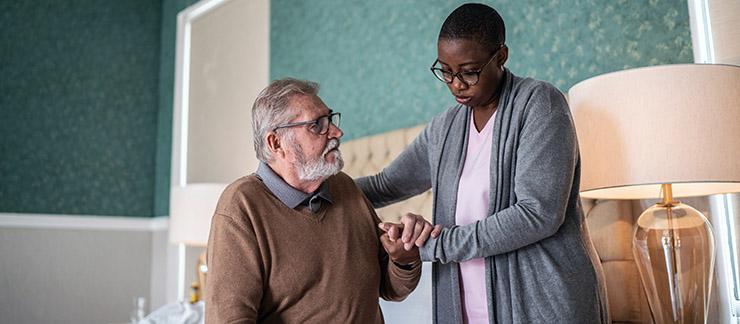
Non-Medical Care for Seniors with MS
Living with Multiple Sclerosis (MS) requires more than just medical attention—it demands understanding, patience, and personalized care that honors the dignity and independence of your loved one. At Visiting Angels, we recognize that MS is more than a medical condition—it's a daily experience that touches every aspect of a senior's life.
Our specialized non-medical care services support each unique MS experience with specially trained caregivers who adapt to your loved one's changing needs. From daily activities to emotional support, our dedicated caregivers empower seniors with MS, providing compassionate care that helps them maintain the highest possible quality of life.
Challenges of MS in Aging Seniors
Around 1 million people in the U.S. live with multiple sclerosis (MS). This condition happens when the body’s immune system attacks its own nervous system, causing problems with mobility, speech, and vision.
While the exact cause of MS remains a mystery and there isn't a cure yet, there are various ways to manage it. Medications, physical therapy, and devices—such as canes and wheelchairs—can help people with MS maintain independence.
MS is often diagnosed in early adulthood and is a lifelong condition. As the U.S. population ages—and as treatments improve—more seniors with MS are seeking options to age gracefully at home.
The National MS Society states that 85% of seniors with MS need some form of help at home.
Tips to Help Your Senior Manage MS
Because MS affects mobility and muscle strength, the disease can cause an increased risk of falling for seniors. You can reduce the risk of falls by removing tripping hazards such as throw rugs, repairing uneven floor surfaces, and enhancing lighting. Additionally, encourage your loved one to wear properly fitted shoes.
Serve healthy meals rich in fruits and vegetables, lean proteins, and healthy fats to boost your loved one’s overall health and well-being. People with MS may have swallowing difficulties and might require softened or pureed foods. Professional companion care can help with grocery shopping and preparing nutritious meals, allowing you to take a break from your other responsibilities.
Studies have shown that exercise improves MS symptoms and reduces relapse rates. Physical activities can include gardening, walking the dog, and regular strolls. Yoga or water aerobics can also help your loved one relax through breathing, movement, and stretching.
Your loved one likely has learned many strategies to manage their symptoms at home. As the disease progresses, they may become less likely to ask for help to avoid feeling like a burden. MS can impact the part of the brain that regulates mood, so watch for common emotional changes such as:
- Anxiety
- Depression
- Fear
- Moodiness or irritability
- Sadness
People with MS may report worsening symptoms when stress levels rise. Ideas to reduce stress include planning fun outings, taking a walk, practicing mindfulness, or listening to pleasant sounds on an app.
Professional Care Can Help Your Loved One Manage MS at Home
Visiting Angels can help with tasks of daily living, such as grooming, bathing, and reducing the risk of falls. Our goal is to support your aging loved one’s need, preferences, and level of independence.
MS is a lifelong condition, so it’s important to learn as much as you can about the disease. Working with a non-medical professional home care service can provide you with reliable respite care and support when your loved one needs extra help.
Connect with your local Visiting Angels home care office to discuss options to support your family.
